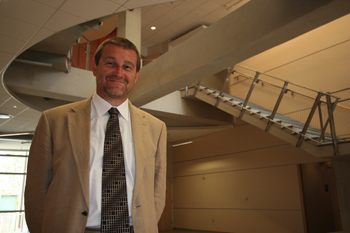New Center at UCSD Aims to Help Bridge Gap Between Biologists and Computer Scientists
Center for Algorithmic and Systems Biology to Host Three Conferences
San Diego, CA, October 17, 2006 -- The University of California, San Diego division of the California Institute for Telecommunications and Information Technology (Calit2) will host three conferences devoted to the disciplines of algorithmic biology, systems biology and computational proteomics. The conferences will run consecutively Nov. 30-Dec. 3 on the UC San Diego campus, and will feature a stellar roster of roughly 20 invited speakers from top American and international institutions.
|
The opening conference will coincide with the formal inauguration of a new Center for Algorithmic and Systems Biology (CASB), created by Calit2 to undertake original research, educational activities in bioinformatics, as well as regular conferences, workshops and seminars.
"The center was conceived by faculty in Computer Science and Engineering at UCSD but quickly grew to include many leading bioinformaticians in the San Diego area,"said CASB director Pavel Pevzner, who holds the Ronald R. Taylor Chair in Computer Science in UCSD's Jacobs School of Engineering. "We are very fortunate that Calit2 provided a home for CASB. Without that support it would be difficult to bring bioinformaticians from many different departments and institutions in the San Diego region under the same roof." "CASB is dedicated to the study of computational approaches in biological sciences," said CASB co-director Steve Briggs, a professor of biological sciences at UCSD. "It will serve as a worldwide bioinformatics conference center and forum for researchers in algorithmic and systems biology."
"This new center meshes perfectly with Calit2's mandate to pursue interdisciplinary research, especially in cutting-edge fields where Calit2 can become a world leader," said Ramesh Rao, director of the UCSD division of Calit2. "Pavel Pevzner, Vineet Bafna and Mohan Paturi were all instrumental in developing the concept of the center and working together with Calit2 to bring on board other scientists from UCSD, The Scripps Research Institute and the Burnham Institute for Medical Research to promote interactions among different departments within UCSD, among different institutions in the San Diego region, and between researchers in the academic and industry sectors."
Pevzner will also chair the inaugural conference, Algorithmic Biology 2006 . The day-long Nov. 30 event (co-organized by Pevzner and Ph.D. candidate Nuno Bandeira) will feature five talks by invited speakers: Serafim Batzoglou from Stanford University, Manolis Kellis of MIT, Michael Waterman of USC, UC Santa Cruz’s David Haussler, and Tel Aviv University professor Ron Shamir.
"At the intersection of many diverse disciplines, algorithmic biology represents an exceptionally wide intellectual community that reaches into nearly every area of modern molecular biology," said Pevzner. "The goal of this conference is to discuss the challenges faced in this field today, and to bring computational and experimental researchers closer together." Topics slated for presentation during the meeting range from "interpreting the human genome" to "reconstructing 100 million years of human evolutionary history."
Algorithmic Biology will become an annual conference with a permanent home in Calit2’s state-of-the-art headquarters at UCSD, Atkinson Hall. Proceedings of the 2006 conference will also be available in streaming video over the Internet, and presentations will be archived for later on-demand viewing from CASB’s website (http://casb.ucsd.edu ).
Immediately following that conference, CASB will host two RECOMB satellite conferences. RECOMB stands for Research in Computational Molecular Biology, and the tenth annual RECOMB took place last April in Venice, Italy. UCSD hosted the first satellite conference on systems biology last year, and will stage the Second Annual RECOMB Satellite Conference on Systems Biology Dec. 1-2. Sponsors include Calit2, the International Society for Computational Biology, and the Journal of Molecular Systems Biology.
"The purpose of this meeting is to bring researchers together on various aspects of systems biology," said Trey Ideker, a professor of bioengineering in the Jacobs School of Engineering, who will chair the conference. "Those aspects include integration of genome-wide microarray, proteomic and metabolomic data, inference and comparison of biological networks, and model testing through design of experiments." Among others, topics will include pathway mapping and evolution in protein interaction networks; model prediction of drug mechanism of action and toxicity; identification and modeling of cis-regulatory regions; and comparative genomics of regulation.
Ideker has lined up a distinguished list of invited speakers, including Eric Davidson of Caltech, David Eisenberg of UCLA, Mark Gerstein of Yale, Daphne Koller of Stanford, Tel Aviv University’s Ron Shamir, Martha Bulyk of Harvard Medical School, and UCSD professor of cellular and molecular medicine Bing Ren.
The systems biology meeting will end at midday on Dec. 2 and segue into the opening afternoon session of the first RECOMB Satellite Conference on Computational Proteomics , which continues through the following day. Proteomics is the study of the total protein complement of a cell. The 2006 meeting will focus exclusively on computational mass spectrometry.
"Mass spectrometry is emerging as a key technology for proteomics, with applications in a range of areas," said conference chair Vineet Bafna, an expert in bioinformatics and professor of Computer Science and Engineering in the Jacobs School. "The last few years have seen tremendous improvement in the quality and quantity of available peptide mass spectrometry data, as well as the realization that advanced computational approaches are critical to the success of this technology."
The Computational Proteomics meeting will feature talks by invited speakers including Forest White of MIT, Neil Kelleher from the University of Illinois, Nevan Krogan of UC San Francisco, Marshall Bern of Xerox Palo Alto Research Center, and UCSD professor of biology Steve Briggs.
Related Links
Center for Algorithmic and Systems Biology
Algorithmic Biology 2006
RECOMB Satellite Conference on Systems Biology
RECOMB Satellite Conference on Computational Proteomics
Pavel Pevzner Website
Media Contacts
Media Contact: Doug Ramsey, (858) 822-5825, dramsey@ucsd.edu


